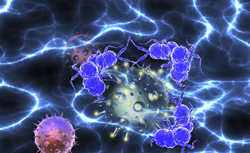Inhibition of cancer cell replication
A telomere (T) is a repeating DNA sequence (for example, TTAGGG) at the end of the body's chromosomes consisting of thousands of base pairs. Each time a cell divides, some of the T is lost and when it becomes too short, the cell stops dividing. Thus, T length is controlled by erosion and addition. Erosion occurs each time a cell divides. Addition is determined by the activity of TE. TE has a very low, almost undetectable activity in somatic (body) cells but is 10-20 times more active in cancer cells. The EU-funded 'Novel oligonucleotide-based strategies for efficient telomerase inhibition' (NOSETI2) project was dedicated to the study of the chemical tools for TE inhibition. In particular, the project has addressed the synthesis of different metal complexes bound to DNA recognising motifs that are able to bind to the specific DNA sequence in T. NOSETI2 has included the characterisation of the interaction between the novel synthesized molecules and a model system mimicking the DNA sequence of the T under physiological conditions. A preliminary in vitro evaluation of the biological activity of these novel molecules to establish their potential as cancer therapeutics has also been carried out. Project researchers synthesised several selective DNA ligands capable of recognising the T sequence. Interaction studies with synthetic oligonucleotides containing the human T sequence mimicking physiological conditions have revealed optimal properties, in terms of affinity and selectivity. In the future, several applications in cancer chemotherapy could be derived from complete biochemical characterisation and biological activity determination. Research in the field of TE inhibition is crucial, especially in the context of the EU work programmes addressing the world-wide prevalence of cancer.







